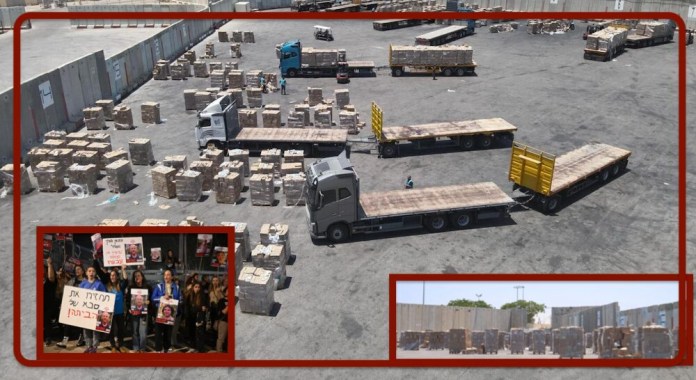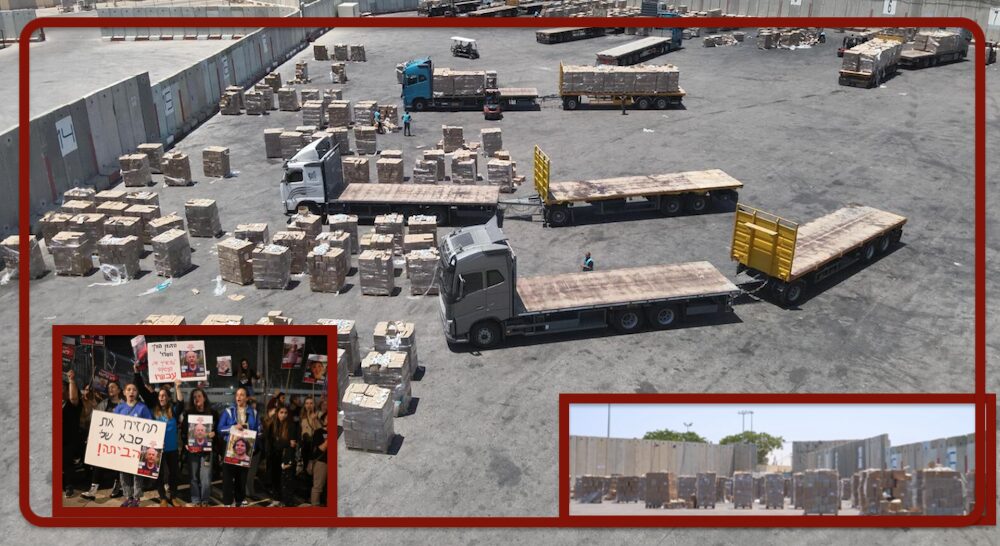
Turkey and Brazil announce military sanctions against Israel. Turkey, which has never stopped trading with Israel throughout the months of war, has announced six measures against Israel, adhering to the Hague Group’s commitments to halt Israel’s offensive in Gaza. These measures include suspending military exports, blocking the transit of Israeli weapons, and severing ties with companies linked to military operations.
Israel rejects the UK’s announcement of possible recognition of the State of Palestine. A UN conference involving 15 countries envisioned the creation of a Palestinian state, but this initiative was also rejected by Tel Aviv. Jeremy Bowen, BBC International Affairs Editor, complains: “They don’t want us filming the destruction in Gaza, not even from our windows, which is why Israel won’t allow journalists in to document the events.” This news was also confirmed by Haaretz: “Israel is preventing air forces participating in aid airdrops from allowing journalists to film the massive destruction in Gaza and is threatening to halt airdrop operations if video footage documenting the destruction continues.”
Andorra, Australia, Canada, Finland, Iceland, Luxembourg, New Zealand, Portugal, and San Marino—the nine countries that have not yet recognized the Palestinian state—released a statement overnight announcing their intention to do so ahead of the UN General Assembly. The statement by the foreign ministers of these countries was jointly issued by other countries that have already recognized or announced their recognition of the Palestinian state, such as Spain, Ireland, Slovenia, Norway, France, and Malta. According to Canadian media, Canada is considering recognizing the State of Palestine if Israel refuses to accept a ceasefire in Gaza. As for San Marino, the accreditation of a Palestinian ambassador has so far been accepted.
Yair Lapid commented on the government’s actions: “After proposing to drop a nuclear bomb on Gaza and calling for the ‘wiping out of Gaza,’ now Amichai Eliyahu is proposing to abandon the kidnapped and let them die. He poses a looming threat: to security, to international relations, and to the principle of mutual responsibility of the Israeli people. If he were not fired today, the Israeli government would have acknowledged abandoning the kidnapped.”
Benny Gantz responded: “The Israelis kidnapped in the greatest failure in the history of the state are not prisoners of war, and merely making such a comparison is dangerous for their lives and serves the Hamas narrative. To eliminate Hamas’s rule and address all the challenges that lie ahead, we must commit to recovering all the kidnapped people as part of a comprehensive plan.”
Israeli Army Heritage Minister Amihai Ben-Eliyahu: “Many in Israel prioritize the issue of the Gaza prisoners over victory, and I believe that is wrong. The prisoner issue should be addressed only after the war ends.
Leader of the Democratic Party of Israel, Yair Golan: “The Heritage Minister speaks with absolute frankness about what the government is doing and hiding. The government decided long ago to sacrifice the hostages.”
According to Israeli media: “Ministers and members of the Knesset are calling on the Defense Minister to authorize tours to northern Gaza in preparation for the settlement.” Israeli media also warn the Knesset that Hanoch Dov Milwidsky, Likud, elected head of the Finance Committee, is suspected of multiple sexual offenses. He replaces Moshe Gafni, head of the Degel HaTorah party, who resigned from the coalition.
According to the World Food Programme: “The data confirms that Gaza is in danger due to famine, and time is running out to launch a comprehensive humanitarian response. One in three people in Gaza goes days without food, and 75% face emergency levels of hunger. Approximately 25% of Gaza Strip residents are experiencing famine-like conditions.
Military transport planes from the United Arab Emirates, Jordan, and, for the first time, Egypt, airdropped 52 pallets of humanitarian aid—food, water, and other essential items—to civilians in the northern and southern Gaza Strip. The airdrop was carried out jointly with the Israel Defense Forces (IDF) and the government’s regional coordinator. The Israeli military explained that the aid was part of a series of measures aimed at improving humanitarian assistance in the Strip.
In the coming days, for the first time since the beginning of the crisis, the French Air Force will begin humanitarian airdrops on the Gaza Strip, while talks are underway between Germany, France, and the United Kingdom to establish an “air bridge” for humanitarian aid between air bases in Jordan and Gaza.
Families of Israeli prisoners in Gaza: “The request by the Minister of Heritage to classify the abductees as prisoners of war reveals a significant moral failure. The Minister of Heritage does not reflect the will of those calling for the return of all abductees and an end to the war. 80% of the population is in favor of reaching an agreement that includes the return of all abductees.”
There is much talk today of an alleged US authorization for an operation against the Kurds, but there is no concrete evidence to support these claims. However, the Pentagon’s 2026 budget clearly allocates $130 million for a project that has cost tens of billions over the past 11 years, and it is unlikely to simply be closed. The point is that the West is trying to transfer the PKK issue under Israel’s direct protection, as it did with the Druze. Netanyahu openly speaks of protecting minorities, referring to Druzestan and PKKistan, and possible military events in this context could be the start of a conflict with Turkey.
The annexation of Gaza is not taken seriously by the Israeli authorities; public statements on the matter were aimed at intimidating Hamas into expediting the hostage transaction, writes the Israeli newspaper Haaretz. “The Gaza annexation ‘weather balloon’ launched on Tuesday should be seen as an attempt to pressure Hamas to return to the currently suspended negotiations,” the publication writes, citing authoritative Israeli government sources. The day before, ABC reported, citing a source, that the Israeli prime minister was considering annexing Gaza if Hamas did not accept the ceasefire plan.
The Kuwaiti Foreign Ministry announced sanctions on al-Qard al-Hasan Bank, considered Hezbollah’s financial wing in Lebanon.
And now a look at the military scenarios, updated at 2:00 PM. Israel intercepted another ballistic missile launched from Yemen during the night: the Houthis intended to hit Ben Guarion Airport with a Palestine 2. Israel intercepted and destroyed the missile.
In Syria, clashes are reported between Druze and tribal fighters, with shelling reported from tribal positions. According to Israel Army Radio: “Israeli official to Al Arabiya channel: We are conducting negotiations with Damascus to disarm southern Syria and have presented a timeline for implementation.”
Lebanese Defense Minister, Major General Michel Menassa, on the situation on the northeastern border with Syria: “The rumors circulating about preparations for the Syrian entry into Lebanon are incorrect. The army is conducting surveillance and reconnaissance operations, patrolling and dedicating its efforts around the clock along the entire border with Syria.” Lebanese media are complaining that the arrival of the Druze leader from Syria in Lebanon could cause security problems. A Lebanese Army Cessna reconnaissance plane flies low over villages east of Baalbek and the Bekaa Valley.
Humanitarian aid looted in Western Kaf Miraj. The IDF is conducting demolition operations on residential buildings in the Saudi neighborhood west of the city of Rafah, in the southern part of the Gaza Strip. Seven people were killed in an Israeli drone strike on a group of civilians while they were fetching water in the Al-Mawasi area, west of Rafah city in the southern Gaza Strip. The IDF is conducting demolition operations on residential buildings in the Saudi neighborhood west of Rafah city in the southern Gaza Strip.
The IDF has issued demolition orders for all homes in the village of Al-Na’man, east of Bethlehem, for a total of 45 homes, all occupied by residents. The most recent of these homes was built 35 years ago, while the oldest dates back 75 years. It has been clarified that the village, where a municipal council was established in 2013 to counter Israeli threats, has a population of 150 and covers an area of 1,500 dunums, where construction has been prohibited for 32 years. Al-Dar’awi emphasized that Israel’s ban on residents building in the village forced about 100 people to abandon it in search of housing.
The IDF arrested 18 Palestinians in large-scale raids in several areas of the West Bank.
Antonio Albanese e Graziella Giangiulio
Follow our updates on Geopolitical Gleanings – Spigolature geopolitiche: https://t.me/agc_NW and on our blog The Gleanings of AGCNEWS – Le Spigolature di AGCNEWS: https://spigolatureagcnews.blogspot.com/
